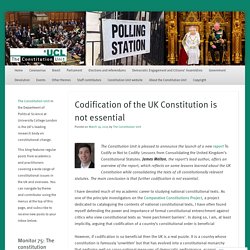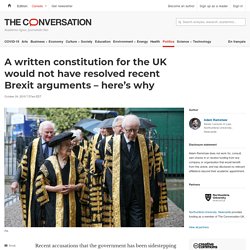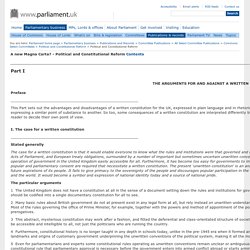

Codification of the UK Constitution is not essential. The Constitution Unit is pleased to announce the launch of a new report To Codify or Not to Codify: Lessons from Consolidating the United Kingdom’s Constitutional Statutes.

James Melton, the report’s lead author, offers an overview of the report, which reflects on some lessons learned about the UK Constitution while consolidating the texts of 18 constitutionally relevant statutes. The main conclusion is that further codification is not essential. I have devoted much of my academic career to studying national constitutional texts. As one of the principle investigators on the Comparative Constitutions Project, a project dedicated to cataloguing the contents of national constitutional texts, I have often found myself defending the power and importance of formal constitutional entrenchment against critics who view constitutional texts as ‘mere parchment barriers’. In doing so, I am, at least implicitly, arguing that codification of a country’s constitutional order is beneficial Like this:
A written constitution for the UK would not have resolved recent Brexit arguments – here's why. Recent accusations that the government has been sidestepping parliamentary scrutiny have led to renewed calls for the UK to have a written consolidated constitution.

It is said the UK has an unwritten constitution, although it’s perhaps more accurate to say that it has an uncodified constitution. There may not be one document, as operates in the US, but there are many written sources of the UK constitution. These include Acts of Parliament and court judgments, which have constitutional significance. There are also unwritten sources such as conventions and customs. Key among these is the unwritten principle that parliament is sovereign – although it seems this may now become a written principle. Judicial Tyranny and Bias. A new Magna Carta? - Political and Constitutional Reform. Part I Preface This Part sets out the advantages and disadvantages of a written constitution for the UK, expressed in plain language and in rhetorical fashion.[7] Many of the arguments overlap with one another and most are inter-related.

Some represent a different way of expressing a similar point of substance to another. So too, some consequences of a written constitution are interpreted differently by proponents on each side of the debate in support of their case. No conclusions are drawn in this paper, leaving it to the reader to decide their own point of view. I. Stated generally The case for a written constitution is that it would enable everyone to know what the rules and institutions were that governed and directed ministers, civil servants and parliamentarians in performing their public duties. Lexington: The perils of constitution-worship. Constitution Check: Would a new U.S. constitution cure Washington gridlock? Lyle Denniston looks at an online editorial that considers dumping the Constitution after last month’s gridlock, and if the Constitution can lead us back to a functioning government.

“America, we’ve got some bad news: Our Constitution isn’t going to make it. It’s had 224 years of commendable, often glorious service, but there’s a time for everything, and the government shutdown and permanent-crisis governance signal that it’s time to think about moving on….It guarantees gridlock, and it’s virtually impossible to change….Dysfunction, trending toward constitutional breakdown, is baked into our DNA.” – Alex Seitz-Wald, in an article in the online edition of Atlantic magazine, November 3. The article was titled: “The U.S. Needs a Constitution – Here’s How to Write It.”
Almost every day, some American, somewhere in the country, is checking up on the health of the Constitution. But, one has to ask: Does any of that prove that the fault lay in constitutional design? Comments comments. Our constitution is far from perfect – but written codification is not the answer. By Ian Adderley I read with interest the article published yesterday calling for a codified constitution.

It is clear that our current written but uncodified constitution – made up of an array of legislation, case law, and convention – isn’t perfect, far from it. However codification, or an attempt to create a new constitution, is not the way forward. Whilst an uncodified constitution does not provide an easily accessible document detailing governance of the country and the rights of the individual, it does provide a living constitution. It is a constitution that can adapt and evolve with the ever-changing conditions in which we live.
The Magna Carta Debate - Time for a Written UK Constitution? - Clarity News. In just under a year on 15th June 2015, the UK will celebrate the 800th anniversary of Magna Carta.

This important legal document limited the power of the King and guaranteed that no person shall be punished except through the law of the land and it is still a key part of life today. With the anniversary fast approaching, a legal and political debate has erupted as to whether the UK is ready for a written constitution. The UK does not have a written constitution, but rather the constitutional system is based on conventions, Acts of Parliament amounting to constitutional documents, historical texts (such as the Magna Carta) and tradition.
This might be baffling for many who come from an enshrined constitutional country, even for those who are from Britain, however that is how the British system works and has worked for hundreds of continual years. That The UK Should Have a Written Constitution.